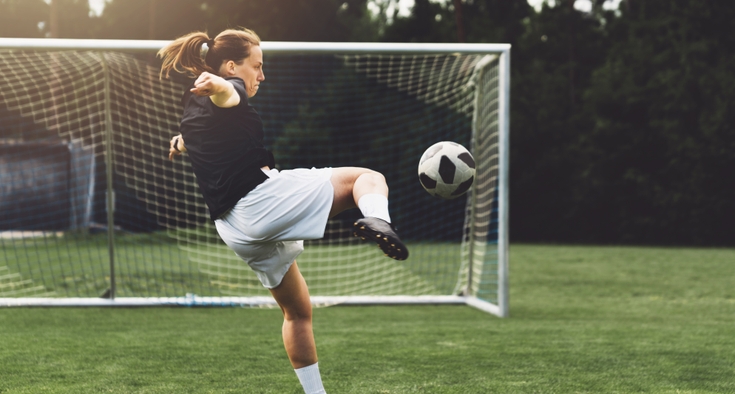You win some, you lose some. But competition almost always puts excessive pressure on the youngest athletes, whether it’s the 7-year-old starting out with his first basketball clinic or the 17-year-old soccer star and her dreams of winning a scholarship.
So much about a game’s outcome is out of their control, and that’s OK, said sport psychologist Dr. John Brunelle. After all, the same goes for much of life.
Of course, convincing them is easier said than done, which is why sport psychologists at Novant Health Orthopedics & Sports Medicine - Cotswold are available to see patients of all ages.
Pressure on the court and the field often eventually leads to hyper-competitive scholarships and college admissions, Brunelle said, and parents don’t always realize they make things worse.
“I often see parents whose kids are a project,” he said. “But as a parent, you should always have your teacher’s hat on: ‘What’s the best lesson at this moment?’”
Dr. Danielle Graham also sees adolescents and adults at Novant Health Orthopedics & Sports Medicine - Cotswold, and helps them address and manage the anxiety that accompanies performance.
“A parent might think, ‘I don’t want my child to experience the rejection of not making this team or not getting into this college,’” Graham said. “But failure is important.”
Sport psychology services include cognitive behavioral therapy and motivational interviewing, another form of therapy. And they extend to the most seasoned athletes mentally recovering from injuries. (Brunelle is the team psychologist for USA Taekwondo and also works with other elite athletes.)
Brunelle and Graham weighed in on why parents should always encourage their children to compete – and never sweat the outcome.
Why do sports and competition matter anyway, and how are they important to development?
Graham: I think it teaches the inevitability of failure and to embrace it at an early age.
Brunelle: It’s about finding what you’re really good at. And what better way to find out where you stand than with competition? If you’re not good, keep going. You’re going to find something that you can master. Wins and losses are great. But we’re built to master things and test ourselves: Did we play our best? All right, let’s do it again next time.
Parents often introduce their children to several sports at once. How much is too much early on?
Brunelle: I had this mentor who used the metaphor of a clenched fist. You can be a striver. But if you have a clenched fist, meaning that you approach things in a very stressful way and are outcome-oriented, you’re spending too much time mentally and physically. Encourage youngsters to be busy but have a light attitude about it.
It’s a great way to learn process over outcome. How we approach the attitude starts with the parents because they’re going to model it. You can put your kids in a bunch of different sports and expose them to all the ups and downs. But it should be more of a teachable, process-oriented moment rather than focused on outcome and results.
Graham: I think one thing to pay attention to is if the stress of one sport is cutting into the stress of another. If we see there’s a lot of struggle and the child is falling behind more than they were prior to those activities, then it’s about having that conversation: Are you getting what you want from these activities? Are they contributing, or are they taking a lot from you?
What role should a parent play, versus that of a coach, in motivating their child’s development on the court or field?
Brunelle: Parents should be very engaged, but not directing—just kind of guiding. You don’t direct them; you teach them about commitment and soft skills: How do they evaluate themselves? How do they handle disappointment? How disciplined are they following through with their goals? It’s about having that conversation and having them ultimately decide what they want to get out of the sport.
One minute a child is engaged and having fun, and the next they’re upset and saying they’re tired and want to quit. What’s really going on?
Graham: We see that a lot. Obviously, every child is different, but some get too outcome-focused. They skip the learning process of, “I don’t have this skill yet. Everyone else around me is doing it and I’m not.” There’s a difference between being impulsive and spending months with anxiety symptoms. We use the phrase “process over outcome,” which is learning and sitting with frustration versus just having the skill.
Brunelle: If they’re not enjoying themselves, that’s interpreted as they want to be somewhere else. And I think that’s a teachable moment. You don’t talk them out of the reasons to quit; you talk them out of quitting: “I know this is hard, and we’ll think of something afterward to reward you for sticking it out even though you’re tired.”
What about the value of getting your frustrated child to hang in there?
Brunelle: This is where it’s not just the conversation, it’s also about teaching them skills like taking a few breaths. If you regulate the breath, you’re going to regulate the mind. And do that work ahead of time by saying, “Hey, Bud, it’s going to be hard because our mind is going to make us feel tired. But you have this tool. Take three nice soft belly breaths and see where you are.”
So depending on their age, should that conversation happen in the moment or wait until after practice or a game?
Graham: I think you can try to have that conversation off the court and encourage them to make the decision to go back in. I think some children might need time to cool off. If they’re acting out behaviorally, we want to be careful about forcing them back into a game if they’re going to disrupt their teammates.
At what age should mindfulness and breathing come into play, especially if your child is stressed about missing free throws, for example?
Brunelle: Mindfulness is just paying attention to the body in the present moment. I think the most important thing is curiosity. We’re such doers and we want to focus on the outcome, especially at that age. Instead, encourage them to be curious and take a shot. Sometimes you miss it, sometimes you make it.
There’s a strong movement toward nutritional psychiatry. I think that’s where we can change kids’ lives the most. Mindfulness and breathwork compete against antidepressants and anti-anxiety medication. Mindfulness competes with Adderall (used to treat ADHD) as far as changing attention and concentration. I advise parents to go to a dietitian and make sure that their kid’s diet is good and that they’re hydrating. If someone truly wants to change their kids’ biology, start with nutrition and sleep.
We often hear about helicopter parenting. As a parent, when should I be a fly on the wall at a game, and when should I intervene? Or is it a hybrid?
Brunelle: I like the word hybrid. The Buddhists talk about the Middle Way. I think you stay very involved, and it’s all about a conversation: “You’ve got this, Bud, I’m really proud of you.” When you’re having conversations with coaches, do you solve your child’s problem? No, you solve it with them.
If you’re going to talk with a coach who you think has been negative or abusive, I wouldn’t swoop in and solve the problem. Instead, bring the kid in and say, “Tell him what you told Dad. I’ll be right there with you and I’ll chip in if there’s something you want me to say. We can do this together.” Eventually, adolescents don’t want you in the room. But with younger kids, they watch you and learn how to solve problems.
Graham: I think the word with is really important. As an advocate, you want to be with them as opposed to doing it for them. When they are young, it can help to have an adult in the room to help voice some of their concerns and advocate – versus trying to fix it for them.
Is there a downside of being too easy on kids? Do we do them a disservice by not strongly encouraging them to hang tough?
Graham: Sometimes we define “too easy” as not being involved. But it’s about being present, letting them have those emotions, and challenging them to face those things as opposed to back away.
Brunelle: I have a 25-year-old daughter who doesn’t know how to ride a bike. Early on she was saying, “I don’t want to do this, Daddy,” and I was like, “OK, let’s go get an ice cream.” She still doesn’t know how to ride a bike. And I think I probably did her a disservice. So I think there are consequences with not exposing kids to difficult things early on.
What about those parents who confront referees in front of children? Do you find this is still festering in school sports, and how do you steer conversations around it?
Brunelle: I think it’s just getting worse. First of all, it’s just ugly, but I think you’re teaching the kids to worry about things that are not under their control. I work with some elite teams; they’re 25 or 26, and their parents are still trying to solve their problems and taking it personally if their kid doesn’t make a top team. I worry about the development of the child, and I worry about the parents who are living not just vicariously through the kids, but relying on so much that is out of their control.
I imagine it can be a challenge identifying potential patients if their parents aren’t onboard with seeing a sport psychologist.
Brunelle: I tell parents upfront I’m going to teach their kid skills that are going to make them a better person. I also tell parents, especially with scholarships at stake, that there’s so much talent out there and you want your kid to be well-adjusted. Talent is a dime a dozen now. Does your kid handle failure well? Are they OK with sitting on the bench? I try to join parents where they are. I know they want a scholarship and what’s best for their kid. But the best thing you can do as a parent is teach these soft skills. Character matters. That’s what coaches are looking for. It’s not just grit; they need grace.
Is there a certain age when adolescents turn the corner when it comes to managing stress?
Graham: I think it’s when they’re willing to look inward at their feelings and understand them. It’s handling the pressure or the emotions that come with it, versus acting out and not being willing to push through them. We see that, whether it be inherent or socially, girls work through their emotions as opposed to pushing them down.
Brunelle: I would say the gender difference with maturity I see is how non-verbal and shut-down boys can get. Sometimes I don’t think they know that something is wrong. Parents should empathize with them: “I know this is hard. Adolescence is going to be the hardest part of your life. But your mom and dad are here.”
What do you wish parents asked you about more often?
Brunelle: Parents need to take care of themselves first. All the things that you want your kid to do, you need to do, too. How do I get my kids to meditate? You need to meditate. How do I help my kid handle loss? How do you handle loss? The best thing you can do for your kids is take care of yourself.













